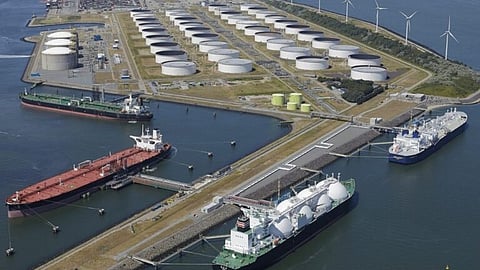

Conservative parties joined forces with the centre-right in the European Parliament on Thursday to back further cuts to the bloc’s “corporate sustainability” laws, after months of pressure from companies and governments including the US and Qatar.
The European Union’s corporate sustainability due diligence directive (CSDDD) was adopted last year and requires companies to fix alleged human rights and environmental issues in their supply chains, or face fines of up to five per cent of global turnover.
The law has become a political flashpoint, with countries including the United States and Qatar demanding it is weakened further. They have warned the rules risk disrupting their gas supplies to Europe.
In a vote on Thursday, the European Parliament determined that only companies with at least 5,000 workers and €1.5 billion ($1.75 billion) turnover should comply, and removed the need for them to set out their plans to meet “climate change” commitments.
Currently, CSDDD’s thresholds are 1,000 employees and €450 million turnover. The due diligence rules had already been delayed by a year to July 2027.
The lawmakers also voted to increase the size of company that needs to report on its impact on people and the planet, removing this obligation from around 90 per cent of companies initially covered.
Jorgen Warborn, the Swedish centre-right lawmaker overseeing the file, said the changes were among the most important proposals for reducing red tape for companies, saving them around €5 billion per year and helping redress the EU’s growth deficit versus rivals such as the United States.
The EU parliament rejected proposals for a less radical weakening in October, prompting the centre-right European People’s Party to table new amendments, which conservative parties supported, to the dismay of other groups.
Other firms such as Ikea and Aldi have said they support due diligence legislation.
European Parliament representatives will still need to negotiate a final text with counterparts from EU governments. They hope to do so by the end of 2025.
(Reporting by Kate Abnett and Philip Blenkinsop, Editing by William Maclean, Aidan Lewis)
The conservative Patriots for Europe, which includes Marine Le Pen’s French National Rally and Hungarian Prime Minister Viktor Orban’s Fidesz party, said the "cordon sanitaire" to sideline non-centrist groups had been broken for the first time. The groups can now form a majority due to a rightward shift of the EU assembly after elections last year.
Companies including TotalEnergies and ExxonMobil have demanded the EU go further and fully withdraw the policy, warning it makes it harder to do business in the bloc.
